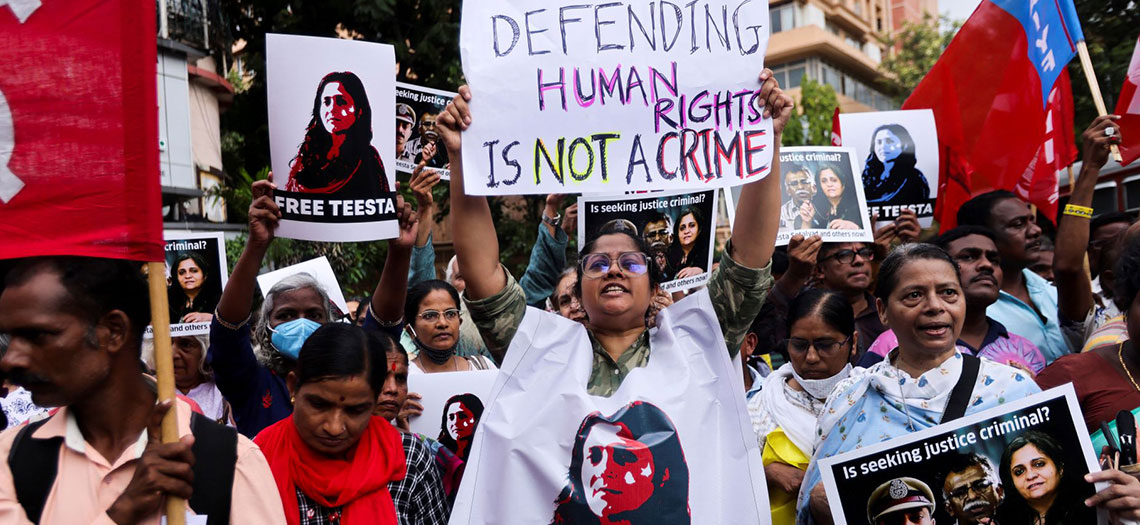Table of Contents
Coordinate targeted advocacy

Together with partners, we submitted reports to the HRC ahead of the UPR of nine countries: Afghanistan, Cambodia, Côte d’Ivoire, DRC, Eritrea, Ethiopia, Nicaragua, Qatar and Vietnam. The submissions focused on civic space, including an analysis of the state of the rights to freedoms of association, expression and peaceful assembly and the situation of HRDs.
We increased support for partners to participate in advocacy missions and side events and attend HRC sessions. As a result, 51 per cent of our statements were delivered by CIVICUS members and partners, up from 25 per cent in 2023. We also participated in the drafting and release of responsive advocacy statements on civic space developments in Bahrain, Bangladesh, Hong Kong, Malaysia, Nicaragua, Saudi Arabia, Senegal, South Sudan, Sri Lanka and the UAE.
Our New York UN Hub contributed civic space data and insights to the call for input for the report of the Special Rapporteur on the Promotion and Protection of Human Rights and Fundamental Freedoms while Countering Terrorism. Our submission highlighted key violations such as the harassment of activists, CSOs and journalists, the arbitrary detention of protesters and the approval and use of restrictive laws. The Special Rapporteur’s final report acknowledged submissions from 38 CSOs and individuals and mentioned CIVICUS as a contributor.
We supported DefendDefenders in organising a global consultation with the outgoing and incoming UN Special Rapporteurs on FoAA, Clément Voule and Gina Romero. The consultation took place in Uganda in April 2024, preceded by a convening of the Freedom of Peaceful Assembly Global Resource Hub in Georgia.
As part of our UN engagement, we highlighted the challenges of civil society participation at the UN. As a member of the UNMute Civil Society initiative, which includes 460 civil society partners and 60 UN member states, we advocated for reforms to democratise the UN and create more space for civil society in UN-related mechanisms. More than 40 missions to the UN echoed our calls. In April 2024, we joined the Steering Committee of the 1 for 8 billion Campaign
Amplifying civil society voices at the UN Human Rights Council
During the 54th and 55th HRC sessions, we continued to highlight civic space concerns and human rights violations. We called on the international community to closely monitor the situation in countries on the CIVICUS Monitor watchlist, highlighted the cases of arbitrarily detained HRDs featured in our Stand As My Witness campaign in countries such as the DRC and Venezuela and delivered statements on the dire civic space situation in countries such as Nicaragua and South Sudan. We called for urgent international action to address gross human rights violations in the Occupied Palestinian Territories and highlighted the suspension or review of funding to Palestinian and Israeli CSOs fulfilling vital watchdog roles.
During the sessions, we facilitated and joined several side events organised by partners and allies on issues including youth activism, the role of HRDs in promoting accountability for atrocity crimes, the participation of young defenders in shaping the future of human rights in Asia, accountability for extrajudicial killings and enforced disappearances in the Philippines, and the human rights situation in Azerbaijan ahead of the COP29 climate summit and in the Middle East in the context of current humanitarian and security crises.
We engaged with the HRC in work leading to its decision to request the General Assembly to authorise it to continue using online participation tools in all its formal and informal meetings, improving opportunities for civil society participation.
The 55th session concluded with 32 resolutions, two decisions and 14 outcomes of the UPR process. While the HRC’s response to calls to respect civic freedoms varied, it issued several thematic and country-specific resolutions touching on civic space issues, including one on countering disinformation while respecting freedom of expression, and another on the prevention of genocide that encourages civil society engagement through advocacy and monitoring.
At the national level, we continued our work as part of CHARM, a consortium of seven partners supporting activists, civil society groups, HRDs, journalists, media professionals and social media producers in Africa. We supported partners in Mali, Nigeria and Uganda to mark International Human Rights Day and International Women’s Day. Activities included community dialogues highlighting the struggles of women HRDs, particularly Indigenous women, young women, women from grassroots communities and those fighting for land rights. The events provided an opportunity for activists and excluded communities to engage with the authorities and other relevant stakeholders. In March 2024 we coordinated a solidarity mission to Zambia.
Fostering unity to strengthen civic space in Zambia
CHARM has a long history of supporting Zambian civil society by coordinating advocacy, forging strategic alliances with key national stakeholders and strengthening local organisations to push for legal and policy change.
Our mission in March 2024 sought to capture the results and lessons learned from 15 years of work and identify the resources needed for sustained impact. We convened meetings with a wide range of national stakeholders, including the Human Rights Committee of the Zambian National Parliament, the Ministry of Justice, the Zambian Human Rights Commission and local government and police authorities. We provided financial support, relationship-building opportunities and technical advice to 17 civil society groups.
We found evidence that our sustained engagement in Zambia has led to civic space improvements. For example, more radio and television stations are now allowed to operate and civil society has more opportunities to engage with the media.
Our support has also contributed to legislative changes, including the repeal of the death penalty, decriminalisation of defamation of the president and freedom of access to information, with the enactment of the Access to Information Act 2023. A new Public Assembly Act has been introduced to replace the restrictive colonial-era Public Order Act. While there is still frustration at the slow pace of reform, the drafting of the bill and the involvement of civil society in the process represent progress.
Following the solidarity mission, we agreed to continue to provide financial and technical support to partners’ advocacy efforts. At a meeting with the Zambia Human Rights Commission, we agreed to work together to operationalise the Access to Information Act, launch national consultations on a proposed NGO Bill and create a working group forum for civil society to engage with the Commission and the Ministry of Justice.

Advocacy Highlights
